Welcoming Students into Nature
By Keith Williams, Vice President of Engagement & Education
There is an extinction of experience taking place, with adults and youth spending less time in nature, but we are reversing this trend. To that end, Lancaster Conservancy ran 177 interpretive events that reached 5,700 people this year, and 25 of those were school programs that brought 1,400 students into nature. The students we served this year came from a variety of districts including School District of Lancaster, Penn Manor, Conestoga Valley, Donegal, and York City.
One school that particularly stands out is Jackson Pre-K-8. Jackson Pre-K-8 is a York City school where 100% of the students are economically disadvantaged. The school’s administration understood the importance of getting all of their students into nature multiple times. They also understood the opportunity the Conservancy’s nature preserves offer for this work. After multiple meetings and lots of coordination, we ran a professional development day at Wizard Ranch for their entire faculty, during which we demonstrated how outdoor learning can enhance reaching curriculum standards, how being in nature helps us physically and emotionally as adults, and how getting students outside will increase their social emotional learning in addition to contributing to their academic performance.
Not everyone likes being in nature. There was some fear we had to overcome that day. There were also other challenges we needed to overcome in order to get 90 Jackson students outside for the day.
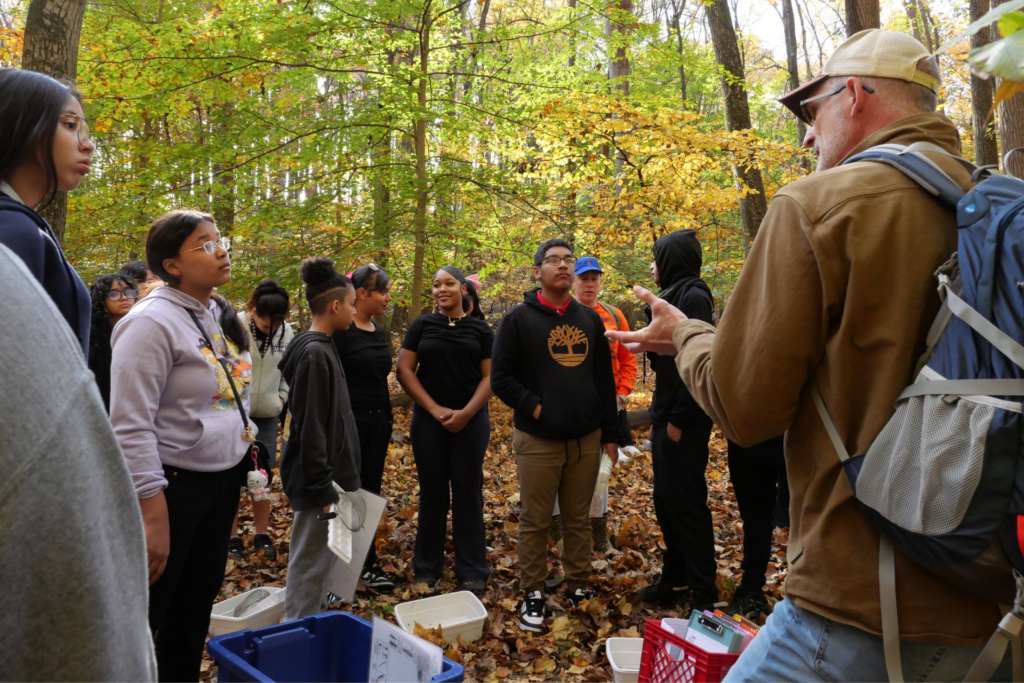
Jackson Pre-K-8 students at Wizard Ranch Nature Preserve (Photo by Avery Van Etten)
One of those challenges was capacity – 90 students far exceed our staff’s capacity. We have a corps of 10 education volunteers, mostly retired teachers, who filled that gap. Our Conservation Educator Peggy Eppig was instrumental in figuring out the logistics of serving this many students at once.
Then there was the transportation barrier. If buses are even available, they are prohibitively expensive, especially for a school whose student body is economically disadvantaged. The Conservancy covered transportation costs to eliminate that barrier. The assistant principal pulled me aside as students spilled off the buses into Wizard Ranch Nature Preserve and told me 90% of these students had never been outside in nature.
We had four stations set up that day for students to rotate through: meadows, forest forensics, streams, and birds. My job that day was easy – I rotated between each of the stations to make sure no one needed anything. I got to watch engaging education being delivered. I got to watch connections being made before my eyes among students, their teachers, our volunteers, and nature. It’s amazing to witness this and so hard to describe.
I caught up with Peggy who was teaching a bird lesson at the top on the meadow that overlooked the over-200-acre preserve. The students were momentarily engaged in hands-on learning, as Peggy and I quickly chatted.
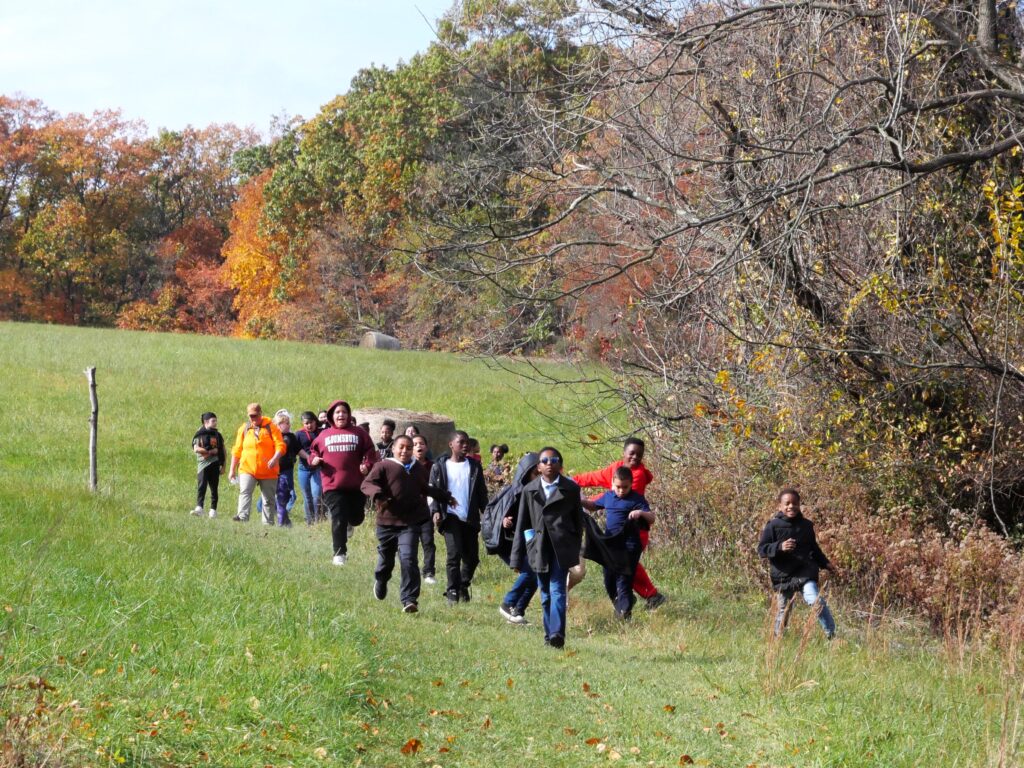
Jackson Pre-K-8 students finish a bird study at Wizard Ranch Nature Preserve (Photo by Avery Van Etten)
“There are kids here who have to be the parent in their family,” she said. The group of 12- and 13-year-olds twirled through the meadow, emulating the vultures they watched. We gave kids the opportunity to be kids again, even if just for a few hours, in nature. We both choked back tears. It’s hard to hear of the difficult reality our kids face. The students finished that part of the lesson, so Peggy re-engaged with them. I took a few steps away so as to not disrupt and overlooked the preserve from this high point.
I reflected on all of the work volunteers had put into removing invasives from 40 acres of Wizard Ranch Nature Preserve to restore native species and ecology, and all the work that went into just getting these students outside. Years of work intersected in that moment, in a lot of ways culminating in these 90 students from Jackson being in nature for the first time, and I felt immensely proud of the Lancaster Conservancy for making all of it happen.
This is why we do our work. We are protecting and restoring thousands of acres of land. We are reversing the local extinction trend and we are reversing the extinction of experience. We are forming a conservation community. And we are giving kids invaluable experiences in nature they will never forget.
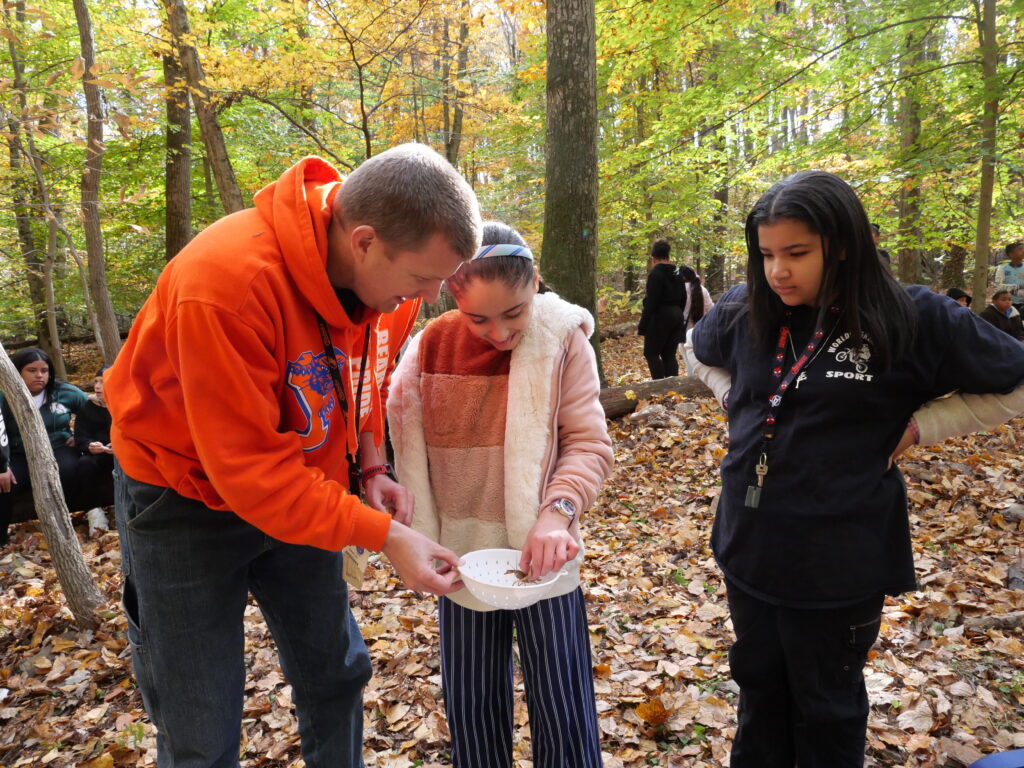
Jackson Pre-K-8 students participate in a stream study activity at Wizard Ranch Nature Preserve (Photo by Avery Van Etten)
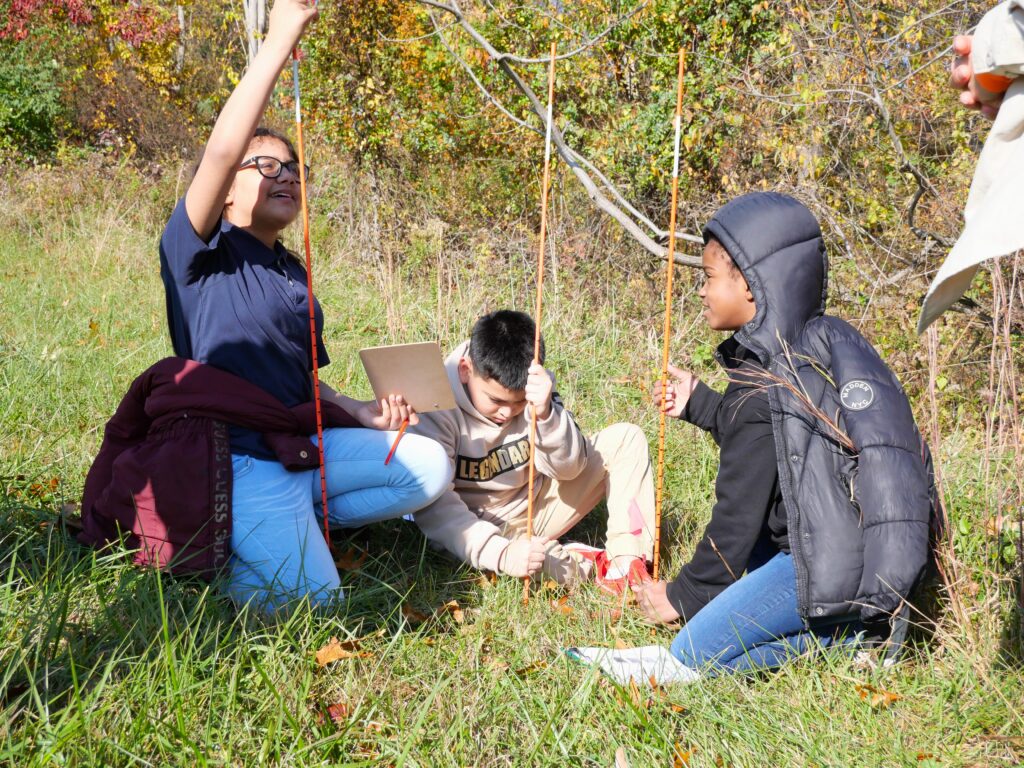
Jackson Pre-K-8 students study a meadow at Wizard Ranch Nature Preserve (Photo by Avery Van Etten)
Lancaster Conservancy’s Conservation Education Programming for Schools
By Peggy Eppig, Conservation Educator
Lancaster Conservancy’s K-12 school program is where we focus on teaching skills and sharing knowledge to prepare the future stewards of the lands and waters we protect today. Through our school group programming, students are engaged in a variety of activities that are place-based and relevant to them. They learn how to determine the health of a freshwater stream and what they can do to support high quality freshwater habitat. They conduct surveys in meadows and forests to measure the biodiversity of bird, insect, and plant species, which helps us predict how our natural spaces may be impacted by local and global environmental challenges. Students participate in stewardship activities like invasive plant removals and gain an understanding of how stewardship is something we can all help with, that every small action really can contribute to creating a better and wilder world.
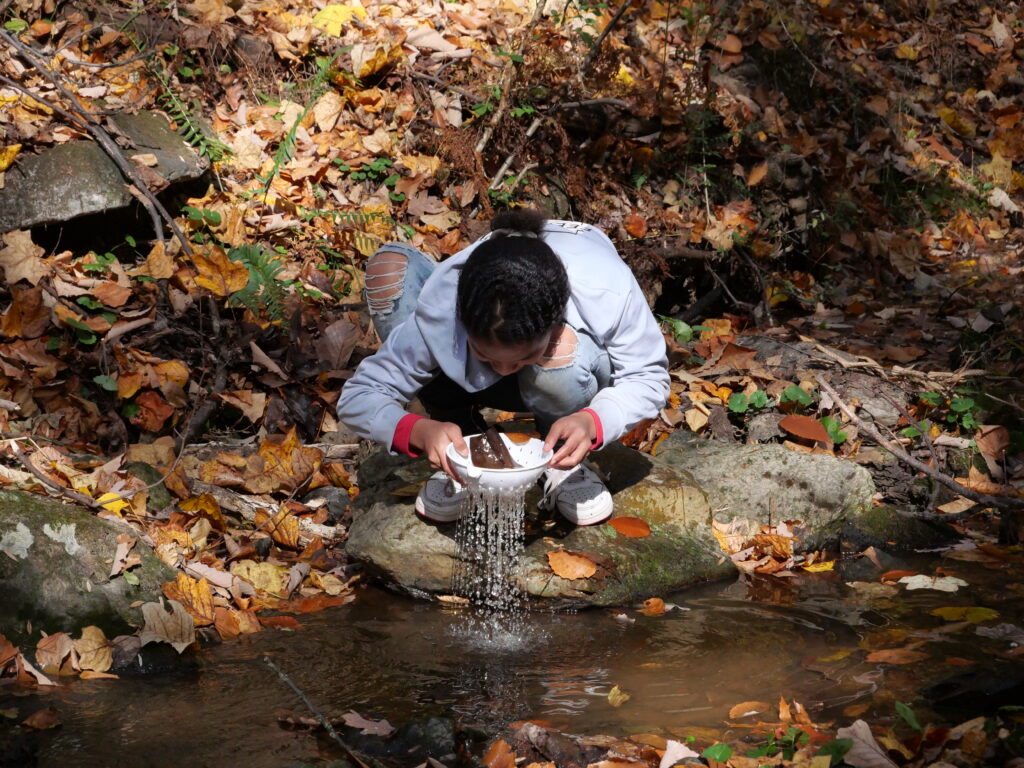
A student searches for macroinvertebrates in the stream at Wizard Ranch Nature Preserve (Photo by Avery Van Etten)
No matter the activity, the Conservancy’s education team strives to connect students with the land and streams we study. We build in time to reflect and time to explore. We want students to feel comfortable and curious about these wildlands. We combine our own love of natural history with ways for students to access their own natural wonder through art, writing, and deep observation.
Lessons are flexible and allow facilitators to capture teachable moments as they happen. Do you hear that pileated woodpecker? What’s he going on about? Someone shouts, “A frog!” and the stream teams abandon their survey to go see. Our educators help students celebrate their discoveries while demonstrating how to respect and protect our non-human neighbors and their homes.
With the support of our staff and volunteer educators, students may begin to develop a life-long love of our natural environment. We often see students return to our preserves with their families or friends to remember their school trip and to teach others what they learned!
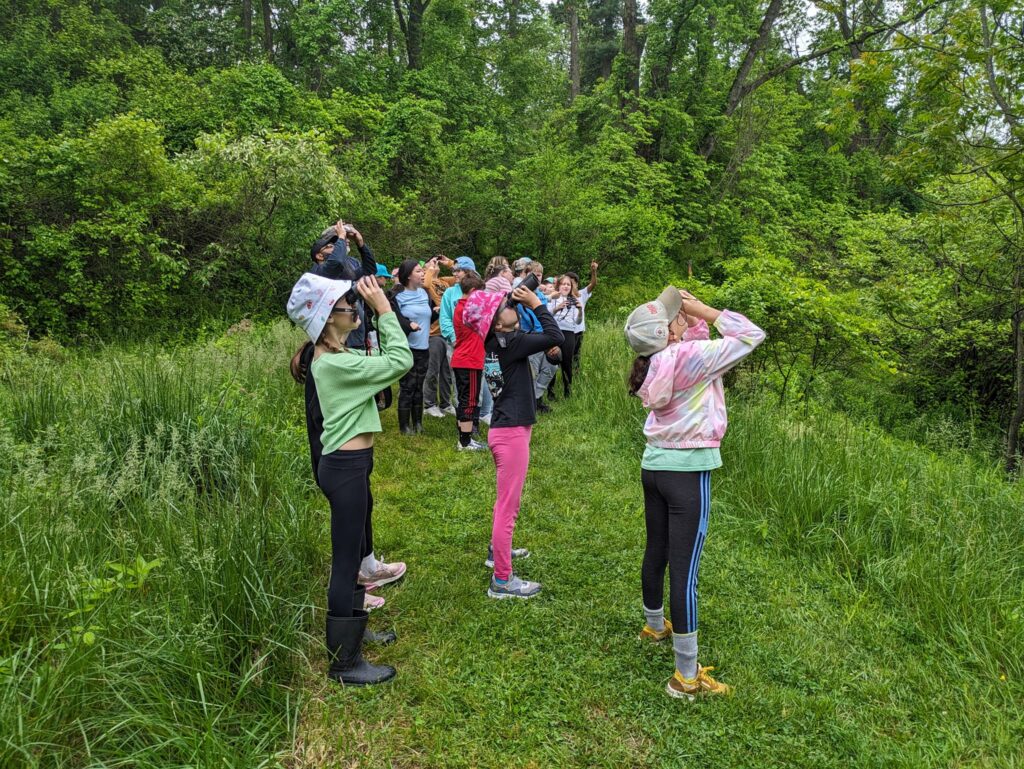
Students observe birds at Wizard Ranch Nature Preserve (Photo by Peggy Eppig)
Our school program expanded in 2024 to include field trips to several different Lancaster Conservancy nature preserves in addition to Climbers Run Nature Center and Wizard Ranch Nature Preserve. We are presently working with students on four Lancaster Conservancy nature preserves, and we have plans to add more locations for which we’ve developed K-12 programs.
From developing and growing our conservation education program to facilitating field activities working directly with students and teachers, our small but mighty group of education volunteers makes this work possible!
If you are interested in joining our conservation education team, please contact me (Peggy Eppig) this winter to discuss your interests at peppig@lancasterconservancy.org.
In addition to upcoming volunteer training opportunities for all Volunteer Land Stewards, happening in February, our team of education volunteers meets once a quarter during the week to practice activities, hone our skills, and learn more about the places we teach. We’d love to have you join us, especially if you have formal or non-formal education skills and enjoy being outdoors!
